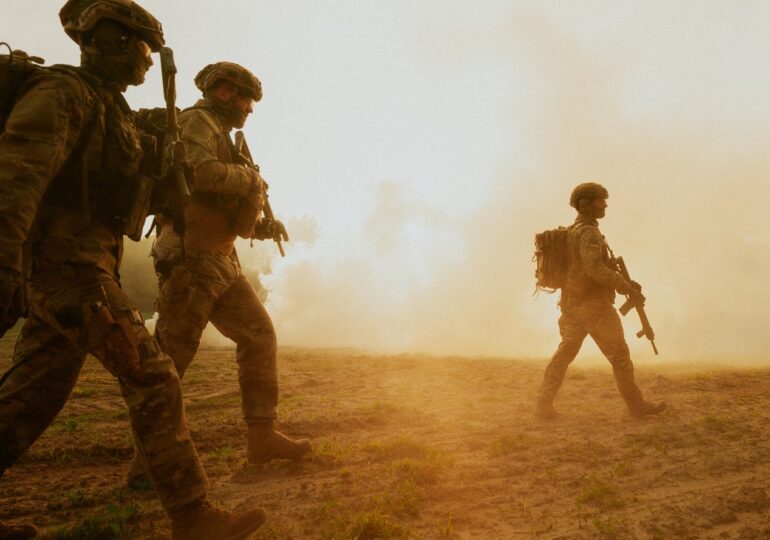Peacekeeping forces have often failed in their missions to prevent wars or have even become targets themselves. In fact, they tend to have more of a symbolic force rather than firepower.
The best chance for peace in Ukraine lies with European mechanized brigades with a clear mandate.
Europe is considering sending peacekeeping troops to Ukraine, but the history of these missions suggests that such a plan is far from a sure bet, writes Business Insider.
Peacekeeping is usually associated with the UN, which first sent military observers to the Middle East in 1948 to monitor the armistice after the Arab-Israeli war, and currently has 72,000 personnel in peacekeeping forces in 11 conflict zones.
Russian troops in peacekeeping forces have served alongside NATO forces in Bosnia and have unsuccessfully acted as a buffer between Armenia and Azerbaijan in the conflict in Nagorno-Karabakh.
The African Union has also deployed forces from South Africa and other black continent states involved in regional conflicts. For poorer nations like Bangladesh and Pakistan, sending their soldiers on relatively well-paid peacekeeping missions has become a source of income.
What Should Peacekeeping Forces Do in Ukraine
The idea of using European troops to maintain an unstable peace between Ukraine and Russia immediately faces a problem related to definition.
What would their purpose actually be there? To maintain peace or to protect Ukraine?
Usually, peacekeeping forces are expected to be neutral and primarily act as observers. The UN lists some basic principles of peacekeeping: impartiality, consent of the parties in conflict, and the use of force only for self-defense.
Accusations of bias against peacekeeping forces are not uncommon. Israel, for example, has long accused the United Nations Interim Force in Lebanon (UNIFIL) of ignoring Hezbollah activities along the Israel-Lebanon border, leading to Israeli troops entering Lebanon in October.
However, a European peacekeeping mission in Ukraine would be problematic.
Even if the proposed force for Ukraine would operate under European auspices rather than NATO's, the troops would likely come from NATO or NATO-friendly nations. It is hard to believe that Moscow would see it as anything other than a permanent Western expeditionary force to defend Ukraine against Russia.
Caught Between Two Enemies
Essentially, there are two concepts for a peacekeeping force. One is to act as an observer of armed conflicts, documenting which side has violated agreements.
The other is to have sufficient force and a mandate to defend an attacked party, similar to the US-led United Nations Command established to defend South Korea from a new invasion, an entity that has been operating for over seven decades.
In both cases, there is a danger: what happens when peacekeeping forces themselves are attacked, either caught accidentally in crossfire or deliberately targeted?
Approximately 4,423 UN peacekeeping troops had died by February 2025, with 1,134 killed in "hostile actions." In Lebanon, UN troops were hit by both Israeli fire and Hezbollah. And earlier this year, several UN troops were killed in fighting with M23 rebels in eastern Congo.
- Congo: Dozens of Romanian Mercenaries from Horațiu Potra's Private Army Attacked by Rebels. Ministry of Foreign Affairs Received Requests for Consular Assistance
- Total Defeat for Călin Georgescu's Armed Branch
- Investigation on Potra's Mercenaries in Congo: Truck Drivers, Supermarket Guards, and People Over 60 Years Old. "Very Serious Mistakes Were Made. As a Result, the Boys Died"
- Roman Gendarme with NATO Operations Experience Takes Leave to Fight in Congo with Potra's "Mercenaries" While Still Listed as an Active Officer
In fact, peacekeeping forces tend to have more symbolic power than firepower. Those ubiquitous white armored vehicles used by UN troops may be enough to deter unarmed rebels and looters, or perhaps insurgents with light arms and rocket launchers.
But in Congo, UN forces face difficulties in clashes with rebels armed with anti-tank rockets and drones.
Any peacekeeping force in Ukraine would be caught between two heavily armed nations with artillery, tanks, rockets, and drones.
Fully equipped European mechanized brigades, supported by the air force, could have the firepower to deter attacks. Ukrainian officials have said that a European peacekeeping mission makes sense only if peacekeeping troops are ready to fight.
On the other hand, Russia invaded Ukraine to control and distance it from the EU and NATO.
A strong force of British and French troops on the border with Russia could be seen as a challenge to the Kremlin.
Russia doesn't even need tanks or cannons to make peacekeeping unsustainable.
There are numerous ways to harass peacekeeping forces, from explosive devices secretly planted by pro-Russian groups to artillery barrages that "accidentally" hit a barracks. While this would risk escalating the cold relationship with Europe and possibly with NATO, Moscow may even hope that causing casualties would prompt European public opinion to demand the troops' return home.
The Two Essential Conditions for Peacekeeping
Ultimately, the success of peacekeeping can only be tangible if peace is maintained or at least violence is mitigated. And historical examples in this regard are not straightforward.
Israelis still remember how, in 1967, the United Nations Emergency Force (UNEF) stationed in Sinai as a buffer between Israel and Egypt abruptly left in response to Egypt's demands. The result? Israel launched a preemptive strike against Egypt in the Six-Day War.
Similarly, UNIFIL troops have been stationed along the Israel-Lebanon border since 1978, but this did not prevent the wars in 1982, 2006, and 2024, as well as numerous border incidents.
Nevertheless, the UN maintains that peacekeeping works, citing successful missions in places like Cambodia and Namibia.
Stationing troops in allied nations has also succeeded in maintaining peace: US troops in South Korea could have deterred North Korea from invading, while forces stationed in Germany during the Cold War helped prevent a Soviet invasion of Western Europe.
Generally, peacekeeping tends to succeed when peacekeeping forces have overwhelming force, either when the conflicting parties decide to cease fighting.
And there is a high chance that a European peacekeeping force in Ukraine would not enjoy either of these conditions.
T.D.

